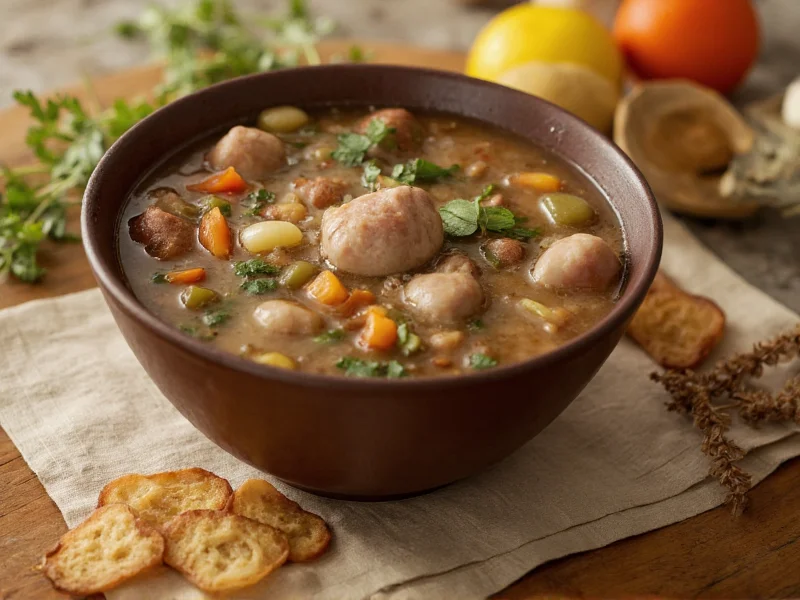When people search for "monkey soup," they're often driven by curiosity about exotic foods, cultural myths, or sensationalized stories they've encountered online. This article separates fact from fiction while addressing the ethical, legal, and cultural dimensions surrounding this misunderstood topic.
Understanding the Monkey Soup Misconception
The term "monkey soup" generates significant online curiosity, but actual recipes using monkey meat are virtually nonexistent in contemporary cuisine. Most searches for "is monkey soup real" stem from:
- Misinterpretations of traditional medicine practices
- Sensationalized travel documentaries
- Internet memes and fictional references
- Cultural misunderstandings about Asian cuisines
Historical Context vs. Modern Reality
Historical records show limited references to primate-based remedies in certain traditional medicine systems, particularly in pre-modern China. However, these practices:
- Were never mainstream culinary traditions
- Have been discontinued due to conservation laws
- Often involved symbolic rather than actual ingredients
| Region | Historical Reference | Current Status |
|---|---|---|
| China | Rare mentions in ancient medical texts | Illegal under wildlife protection laws |
| Vietnam | Misinterpreted "canh khỉ" (monkey soup) | Actually refers to bamboo shoot soup |
| Africa | Occasional bushmeat consumption | Illegal and declining due to conservation |
Why Actual Monkey Soup Doesn't Exist Today
Three critical factors prevent legitimate "monkey soup recipes" from existing in modern cuisine:
Legal Protections
Over 90% of monkey species receive international protection under CITES (Convention on International Trade in Endangered Species). Most countries enforce strict penalties for wildlife trafficking, making commercial preparation of monkey-based dishes illegal.
Conservation Concerns
Primates face significant population declines worldwide. Conservation organizations estimate that 60% of primate species are threatened with extinction, primarily due to habitat loss and hunting.
Cultural Evolution
Even in regions where historical references exist, contemporary culinary traditions have evolved. Modern Vietnamese cuisine, for example, uses "canh khỉ" to describe a bamboo shoot soup—"khỉ" refers to the shape of the bamboo shoots resembling monkey tails, not actual monkey ingredients.
Common Misconceptions Explained
Several factors contribute to the persistent "monkey soup in traditional medicine" myth:
The Translation Problem
Many Asian dishes use animal names metaphorically. In Vietnamese, "canh" means soup, while "khỉ" can mean monkey but also describes certain plant characteristics. This linguistic nuance often gets lost in translation.
Sensationalized Media
Documentaries and travel shows sometimes exaggerate exotic food practices for entertainment value. These portrayals create lasting misconceptions about "what is monkey soup made of" in various cultures.
Internet Folklore
Online forums and social media frequently circulate fictional "monkey soup recipes" as shock content or inside jokes, further muddying the waters between fact and fiction.
Ethical Alternatives for Culinary Exploration
For those interested in authentic Asian cuisine without ethical concerns, consider these legitimate alternatives:
- Vietnamese canh chua: A flavorful sour soup with tamarind and fish
- Chinese medicinal soups: Many traditional recipes use herbs and合法 ingredients
- Indonesian sayur asem: A refreshing tamarind-based vegetable soup
Navigating Cultural Food Discussions Responsibly
When exploring unfamiliar cuisines, maintain cultural sensitivity by:
- Consulting reputable culinary historians rather than sensationalized sources
- Understanding that food traditions evolve over time
- Recognizing that exoticism often stems from cultural misunderstanding
- Supporting sustainable and legal food practices
The persistent curiosity about "can you eat monkey meat" reflects broader questions about ethical food choices in our globalized world. By focusing on legitimate culinary traditions and conservation efforts, we can appreciate cultural diversity while protecting endangered species.
Frequently Asked Questions
Is monkey soup legal anywhere in the world?
No legitimate commercial preparation of monkey soup is legal in any country with wildlife protection laws. While isolated illegal hunting may occur in remote areas, no nation permits the commercial sale of monkey meat for consumption.
Why do people believe monkey soup exists?
The misconception stems from mistranslations of traditional dishes, sensationalized media portrayals, and historical references to outdated practices in traditional medicine that were never mainstream culinary traditions.
What does Vietnamese 'canh khỉ' actually contain?
Vietnamese 'canh khỉ' (literally 'monkey soup') is actually a bamboo shoot soup. The term 'khỉ' refers to the shape of the bamboo shoots resembling monkey tails, not any animal ingredients.
Are there any ethical alternatives to exotic meat soups?
Yes, many traditional cuisines offer flavorful soups using sustainable ingredients. Vietnamese canh chua, Chinese herbal soups with legal ingredients, and Indonesian sayur asem provide authentic culinary experiences without ethical concerns.
How can I verify information about unfamiliar foods?
Consult academic sources on food history, reputable culinary institutions, and cultural experts rather than relying on sensationalized media or unverified online content. Cross-reference information from multiple authoritative sources.











 浙公网安备
33010002000092号
浙公网安备
33010002000092号 浙B2-20120091-4
浙B2-20120091-4